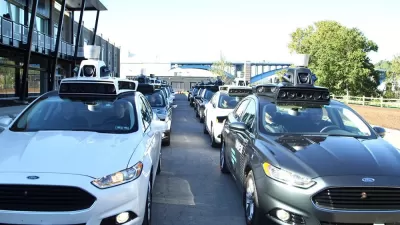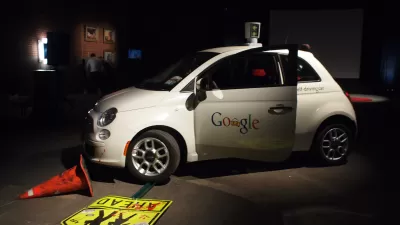So far, only a small minority of major cities have considered self-driving cars in their long-range transportation plans. The question is, should policymakers embrace them or stand in their way?

Citing a report from the National League of Cities, Kim-Mai Cutler contends that many American cities are ignoring self-drivers in their long-range planning. "What's even more surprising is that only 3 percent of these cities' transit plans are even taking into account the impact of ride-hailing companies like Uber and Lyft even though they already operate in 60 of the 68 largest markets in the U.S."
Prospects for autonomous vehicles are intimately tied to land use policy. "The concern is that if suburban governments shirk at designing better, more compact physical space, the additional efficiencies and comforts of self-driving cars will just induce longer mega-commutes and more sprawl, which is bad for the environment."
Much of this hinges on whether self-driving cars (if they catch on) will be privately owned or shared via a transit-like utility. "It's concerning because no one actually knows how much efficiency self-driving cars can really provide. It could be a repeat of the 1940s when streetcar lines in U.S. cities like Los Angeles were dismantled to make way for cars and buses."
FULL STORY: How Many American Cities Are Preparing For The Arrival of Self-Driving Cars? Not Many.

Planetizen Federal Action Tracker
A weekly monitor of how Trump’s orders and actions are impacting planners and planning in America.

Maui's Vacation Rental Debate Turns Ugly
Verbal attacks, misinformation campaigns and fistfights plague a high-stakes debate to convert thousands of vacation rentals into long-term housing.

Restaurant Patios Were a Pandemic Win — Why Were They so Hard to Keep?
Social distancing requirements and changes in travel patterns prompted cities to pilot new uses for street and sidewalk space. Then it got complicated.

In California Battle of Housing vs. Environment, Housing Just Won
A new state law significantly limits the power of CEQA, an environmental review law that served as a powerful tool for blocking new development.

Boulder Eliminates Parking Minimums Citywide
Officials estimate the cost of building a single underground parking space at up to $100,000.

Orange County, Florida Adopts Largest US “Sprawl Repair” Code
The ‘Orange Code’ seeks to rectify decades of sprawl-inducing, car-oriented development.
Urban Design for Planners 1: Software Tools
This six-course series explores essential urban design concepts using open source software and equips planners with the tools they need to participate fully in the urban design process.
Planning for Universal Design
Learn the tools for implementing Universal Design in planning regulations.
Heyer Gruel & Associates PA
JM Goldson LLC
Custer County Colorado
City of Camden Redevelopment Agency
City of Astoria
Transportation Research & Education Center (TREC) at Portland State University
Jefferson Parish Government
Camden Redevelopment Agency
City of Claremont





























